《新思维英语阅读》教学辅导(第5章)
- 格式:doc
- 大小:30.50 KB
- 文档页数:5
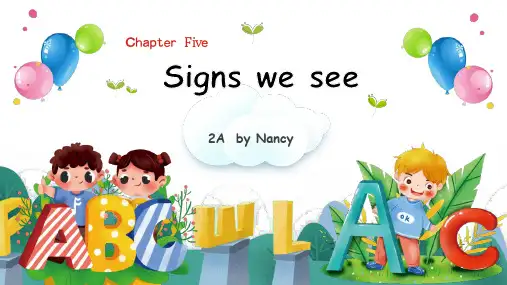
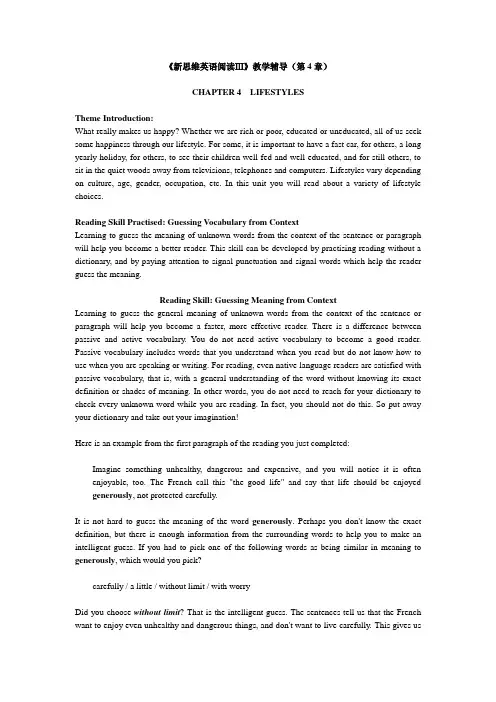
《新思维英语阅读Ⅲ》教学辅导(第4章)CHAPTER 4 LIFESTYLESTheme Introduction:What really makes us happy? Whether we are rich or poor, educated or uneducated, all of us seek some happiness through our lifestyle. For some, it is important to have a fast car, for others, a long yearly holiday, for others, to see their children well-fed and well-educated, and for still others, to sit in the quiet woods away from televisions, telephones and computers. Lifestyles vary depending on culture, age, gender, occupation, etc. In this unit you will read about a variety of lifestyle choices.Reading Skill Practised: Guessing Vocabulary from ContextLearning to guess the meaning of unknown words from the context of the sentence or paragraph will help you become a better reader. This skill can be developed by practising reading without a dictionary, and by paying attention to signal punctuation and signal words which help the reader guess the meaning.Reading Skill: Guessing Meaning from ContextLearning to guess the general meaning of unknown words from the context of the sentence or paragraph will help you become a faster, more effective reader. There is a differenc e between passive and active vocabulary. Y ou do not need active vocabulary to become a good reader. Passive vocabulary includes words that you understand when you read but do not know how to use when you are speaking or writing. For reading, even native language readers are satisfied with passive vocabulary, that is, with a general understanding of the word without knowing its exact definition or shades of meaning. In other words, you do not need to reach for your dictionary to check every unknown word while you are reading. In fact, you should not do this. So put away your dictionary and take out your imagination!Here is an example from the first paragraph of the reading you just completed:Imagine something unhealthy, dangerous and expensive, and you will notice it is often enjoyable, too. The French call this "the good life" and say that life should be enjoyed generously, not protected carefully.It is not hard to guess the meaning of the word generously. Perhaps you don't know the exact definition, but there is enough information from the surrounding words to help you to make an intelligent guess. If you had to pick one of the following words as being similar in meaning to generously, which would you pick?carefully / a little / without limit / with worryDid you choose without limit? That is the intelligent guess. The sentences tell us that the French want to enjoy even unhealthy and dangerous things, and don't want to live carefully. This gives usthe impression of living freely, without limits, rather than being careful or worried.Sometimes, of course, it is necessary to know the exact dictionary definition of a word; for example, when you are using the word in your own speaking or writing, or if you are taking a vocabulary test on the TOEFL or TOEIC. But in the case of reading, checking every unknown word in the dictionary not only slows down your pace and makes you lose the general meaning of the paragraph, it also makes you less confident to use your intelligence and imagination. Of course dictionaries are useful and necessary, and sometimes there is best in this reading course to use your brain more than your dictionary!Practice:It is not always possible to get the exact meaning of the word from the context. But knowing the exact meaning of a word is not usually necessary to understanding the paragraph. Use the context of the sentence to determine the meaning of the underlined word. Then choose the word or phrase which best expresses the word's meaning.1. Much of the world, and the U.S. in particular, has gone on an "anti-fat" campaign.A. planned activities supporting a beliefB. campingC. holiday2. Heart attacks are about twice as likely to strike Americans as French.A. to pleaseB. to hitC. to change3. Y oung professional Americans are becoming more cautious about their alcohol intake, saying that it is safer, healthier to drink less wine and more orange juice.A. carefulB. carelessC. happy4. Drug companies are working on a pill that will reproduce the healthful chemical properties of wine.A. throw awayB. get rid ofC. create something similarIt is very simple! The keys should be: 1. A 2. B 3. A 4. CReading Skill: Contextual Paraphrasing by PunctuationThere are other ways of using context to guess the meaning of unknown words. Sometimes the writer will paraphrase (use other words) to make his meaning clearer for the reader. These paraphrases are often signalled by punctuation. The punctuation which signalparaphrases include:comma (,)double dash (—)set of parentheses ( )For example, in Reading One of this chapter, the following sentence is given in paragraph 2:They load up their shopping carts with fois gras (fatty goose liver), rich cheese, butter-soaked cakes and pastries.In this sentence the unknown French phrase fois gras is defined for you in a set parentheses, as. fatty goose liver. The unknown word is circled, and its definition is underlined.Practice:The following sentences use contextual paraphrasing by punctuation. Circle the words which are being defined. Then underline the definition.1. They are optimistic expecting the best in their future.2. Chinese entrepreneurs began accumulating gathering more money in the late 1990's.3. One reason for their discomfort is that they realize that the prosperity—wealth—that has created the group of newly-rich has not benefited all Chinese equally.4. Many workers have been laid off, losing their jobs temporarily for economic reasons, from state-run factories.Reading Skill: Contextual Paraphrasing by Signal WordsAnother way of using context to guess the meaning of unknown words is to notice when the writer uses signal words to indicate a paraphrase. To make his meaning clearer for the reader, sometimes the writer will signal a paraphrase of difficult words by the following signal words:i.e. - that isthat isin other wordsorFor example, in Reading One of this chapter, the following sentence is given in paragraph 2: (Hedonism), that is, believing that pleasure is the purpose of life, seems to bring health, not illness.In this sentence the meaning of the difficult word hedonism is signalled for you by the expression that is. After the signal words that is, the definition of the difficult word follows. In this example, the unknown word is circled, and its definition is underlinePracticeIn the following sentences, a paraphrase of difficult words is signalled by the signal words given above. Circle the words which are being defined. Then underline the definition.1. While most of the world seems to be motivated by more money, there are some independent souls who are tired of the rat-race, that is, the stressful pressures of working hard to get ahead.2. Each of these groups places a high priority on a sense of community, in other words, the feeling of belonging and mutual support.3. It is multi-generational, i.e. with ages ranging from children to seniors.4. These communities are the newest expression of the 300-year-old American desire to build a non-hierarchical, or equal, community with values uncorrupted by the larger society.Main Idea of Reading Materials:Reading One:本文通过对法国人生活方式地描述,指出:法国人心中“好生活”地概念是:一切顺其自然,无所顾忌,尽情享受的生活。


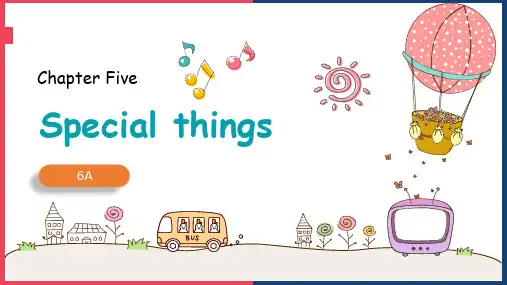
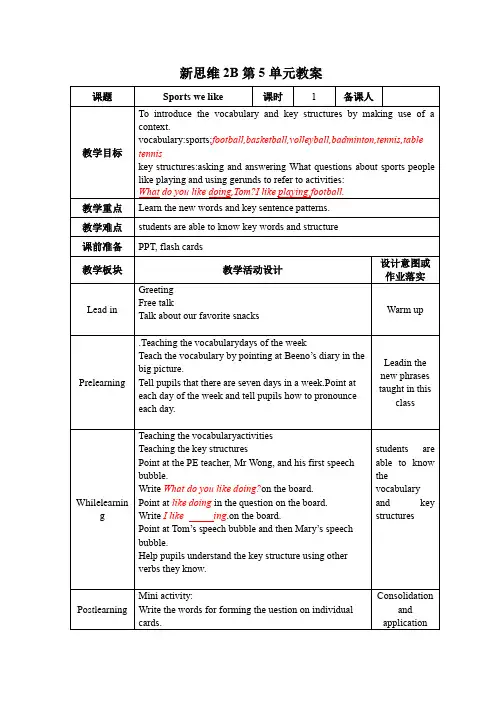

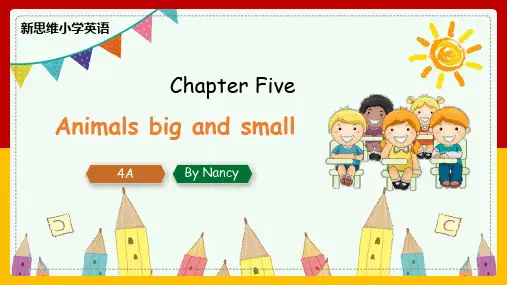
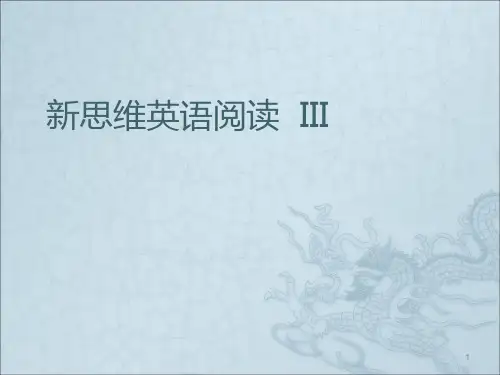
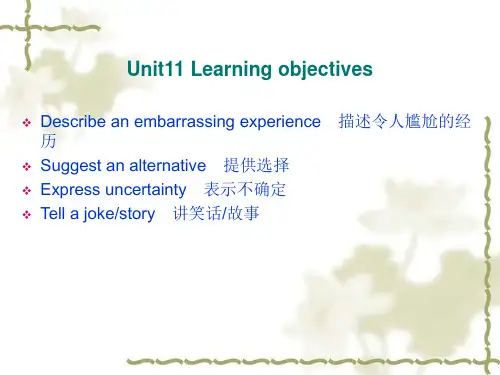
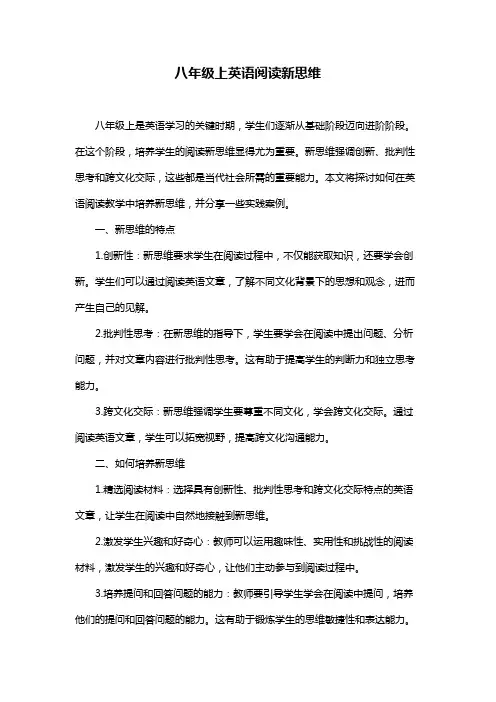
八年级上英语阅读新思维八年级上是英语学习的关键时期,学生们逐渐从基础阶段迈向进阶阶段。
在这个阶段,培养学生的阅读新思维显得尤为重要。
新思维强调创新、批判性思考和跨文化交际,这些都是当代社会所需的重要能力。
本文将探讨如何在英语阅读教学中培养新思维,并分享一些实践案例。
一、新思维的特点1.创新性:新思维要求学生在阅读过程中,不仅能获取知识,还要学会创新。
学生们可以通过阅读英语文章,了解不同文化背景下的思想和观念,进而产生自己的见解。
2.批判性思考:在新思维的指导下,学生要学会在阅读中提出问题、分析问题,并对文章内容进行批判性思考。
这有助于提高学生的判断力和独立思考能力。
3.跨文化交际:新思维强调学生要尊重不同文化,学会跨文化交际。
通过阅读英语文章,学生可以拓宽视野,提高跨文化沟通能力。
二、如何培养新思维1.精选阅读材料:选择具有创新性、批判性思考和跨文化交际特点的英语文章,让学生在阅读中自然地接触到新思维。
2.激发学生兴趣和好奇心:教师可以运用趣味性、实用性和挑战性的阅读材料,激发学生的兴趣和好奇心,让他们主动参与到阅读过程中。
3.培养提问和回答问题的能力:教师要引导学生学会在阅读中提问,培养他们的提问和回答问题的能力。
这有助于锻炼学生的思维敏捷性和表达能力。
4.鼓励小组讨论和分享:组织学生进行小组讨论,让他们分享阅读心得和感悟。
这样可以促进学生之间的交流,培养他们的团队合作精神和表达能力。
5.引导学生进行反思和实践:教师要引导学生从阅读中汲取经验教训,并进行反思和实践。
这有助于将新思维内化为自身的能力。
三、新思维在英语阅读教学中的应用1.教学策略的创新:教师要善于运用多元化教学策略,如启发式、探究式等,引导学生在新思维的指导下进行阅读。
2.课堂活动的设计:组织各种形式的课堂活动,如讨论、辩论、角色扮演等,让学生在实践中锻炼新思维。
3.教学评价的改革:改变传统的评价方式,注重过程性评价和综合性评价,全面考察学生在阅读中的创新、批判性思考和跨文化交际能力。
2016考研资料分享群:248600511第五节名词+过去分词结构英语中的过去分词修饰名词,不长的时候一般放在名词的前面做前置定语。
如果这个过去分词做名词的修饰成分很长,为了避免头重脚轻,也是遵循英语句子注意尾重的原则,英语经常把它放到该名词的后面做后置定语。
下面举例来说明这些情况。
74. Works of several historians reveal the moral compromises made by the American early leaders and the fragi le nature of the country’s infancy.几位历史学家的作品揭示了美国早期领导者们所做出的道德妥协以及这个国家早期阶段不稳定的这种本性。
75. This “added-worker effect” could support the safety net offered by unemployment insurance or disability insurance to help families weather bad times.这种“附加工人效应”可以支持失业保险或残疾保险所提供的保障制度,以帮助家庭渡过困难时期。
76. People are absorbed into “a culture of consumption” launched by the 19th-century department stores that offered “vast arrays of goods in an elegant atmosphere.”人们被一种消费文化所吸引,这种文化是由19世纪百货商店发起的,这种百货商店在高雅的氛围中提供琳琅满目的商品。
77. The earliest forms of art, like painting and music, are those best suited for expressing joy.艺术的最早形式,像绘画和音乐,都是那些最适合表达快乐的艺术形式。
《新思维英语阅读》(III)指导陆河电大--- 彭永碧一.课程介绍英语阅读(3)是专科开放教育英语专业第三学期的必修课程之一,采用的教材为(英)Mary Underwood著;张连仲,牛健,杨启宁编著,中央广播电视大学出版社出版的《新思维英语阅读》(III)。
《新思维英语阅读》(III)由正文、附录两部分组成。
正文包括18章,其中第6、12和18章为复习单元。
每章探讨一个主题,含有四篇阅读文章,内容围绕主题开展。
在四篇文章中,三篇以西方文化为背景,一篇以中国文化为背景。
这样安排的目的是使学习者能就同一话题了解中外不同或相同的观点和看法,并且达到词汇复用的目的。
联系四篇文章的纽带为Beyond the reading:Your opinion for discussion /composition。
附录包括“分页词汇表”和“词汇索引表”两项内容。
本教材的语言材料及其表现形式具有较强的真实性、实用性、趣味性、题材和体裁的广泛性、练习形式的多样性、活泼性以及适合学习者自学等特点。
本教材取材广泛,内容新颖,时效性强,所选文章大多为20世纪90年代的作品,含盖了《全国成人高等教育英语专业(专科)英语教学基本要求中划定的6个语篇题材范围。
本教材十分强调语言素材与日常生活紧密结合,语言素材真实、实用、有趣、反映显示生活。
每章中的4篇不同文章,内容围绕同一个话题展开,方便学习者掌握相关内容,了解不同文体、感知词汇的重复使用。
新思维英语阅读(3)侧重训练宏观掌握文章梗概大意的阅读技能,如:skimming, scanning, making generalization 等,全书18章,除复习单元(第6、12、18章)外,每章系统训练一项阅读技能,其讲解集中在Reading One---Reading Three中,Reading Four则为该项阅读技能的综合练习(Skill Review)。
复习单元(第6、12、18章)则综合练习其前5章的阅读技能。
新思维5a单元知识点全文共四篇示例,供读者参考第一篇示例:新思维5a单元知识点主要涵盖了语文、数学、英语、科学和社会等多个学科。
本文将重点介绍各学科的知识点和重点内容,帮助学生更好地理解和掌握相关知识。
一、语文语文是学生学习的重要学科之一,通过学习语文可以提高学生的语言表达能力和阅读理解能力。
在新思维5a单元中,语文的重点内容主要包括诗歌、散文、文言文等文体的学习和阅读。
学生需要掌握各种文体的特点和写作技巧,同时注重语文素养的培养。
二、数学数学是一门重要的基础学科,对学生的逻辑思维和数学能力提出了要求。
在新思维5a单元中,数学的知识点主要包括整数、分数、小数、算式、方程等内容。
学生需要掌握各种数学运算规则和解题方法,培养良好的数学思维和解决问题能力。
三、英语英语是一门国际性的语言,学习英语可以帮助学生更好地与世界沟通。
在新思维5a单元中,英语的重点内容主要包括英语单词、语法、阅读、写作等方面。
学生需要通过大量的练习来提高英语听说读写能力,同时注重词汇量和语法知识的积累。
四、科学五、社会社会是一个包罗万象的学科,学习社会可以帮助学生更好地了解社会现象和历史事件。
在新思维5a单元中,社会的重点内容主要包括地理、历史、政治等方面。
学生需要了解各种地理现象和历史事件,同时理解政治制度和社会发展规律。
第二篇示例:随着科技的不断发展,人们对于教育的需求也越来越高。
传统的教学方法已经不能完全满足现代学生的需求,因此新思维5a单元知识点应运而生,为学生提供了更多的学习途径和方法。
新思维5a单元知识点是一种以培养学生的创新思维和解决问题能力为目标的教育方法。
这种方法强调学生的自主学习和实践操作,通过实际操作来体验和掌握知识,培养学生的综合能力。
这种教学方法不仅可以提高学生的学习兴趣,还可以培养学生的团队合作能力和创新思维。
新思维5a单元知识点主要包括以下几个方面:1. 多元化的学习方式:新思维5a单元知识点注重培养学生的多元化学习方式,让学生通过不同的方式学习知识,如观察、实验、讨论等,从而激发学生的学习兴趣。
《新思维英语阅读》教学辅导(第5章)《新思维英语阅读Ⅲ》教学辅导(第5章)CHAPTER 5 AGINGTheme Introduction:The search for the secret to long life has existed since time began. We all want a long, healthy life. We notice the signs of our own aging with concern. Why do we age? While medical science, and individuals consider ways to prolong human lifespan, the numbers of people over 60 — and particularly those over 80 — are growing fast. This rapid aging of global society brings many problems.Reading Skill Practised: Word AnalysisAs you learned in Chapter 4, learning to read without constant use of your dictionary will help you become a faster and more efficient reader. However, sometimes the context of the sentence does not give enough information for you to guess the meaning of unknown words. Another vocabulary strategy you can try is word analysis. In word analysis, the reader breaks down English words into common parts and guesses the meaning from the word origin.Reading Skill: Word Analysis (Prefixes)Sometimes the context of the sentence does not give enough information for you to guess the meaning of the unknown word. If that is the case, and you feel you need to know that unknown word's meaning to understand the sentence, then you should open your dictionary. However, there is another vocabulary strategy you might try: Word analysis. In word analysis, the reader breaks down English words into prefix (the beginning of the word), root (the middle of the word, and its basic meaning), and suffix(the end of the word). An example is the word international, which canbe broken down like this:Prefix Root Suffix inter nation al(between) (nat = to be born. Nation means literally\ (about, away of being)a group of people born together\and has come to mean a country.)International is about the relations or exchanges between two or morecountriesYou can use this strategy of word analysis to guess the meaning of theword. Especially if there is some contextual information in the sentenceor paragraph, word analysis can be quite useful.Here is a partial list of common prefixes.Prefix Meaning Example ad-, af- move towards advance anti- against anti-agingauto- self automobile bi- two biannual con-, corn-, co- with conversation en- to giveenlighten de- away from, down decreasehyper- over hyperactive inter-,intra- between, among, within international mini- small minibus maxi- large maximum mis- wronglymisunderstand mono- onemonologue poly- manypolytechnic pre- beforepreview pro- forwards, forth promotesub- under substandard super- above supernatural tele- far telephone trans- acrosstranslateultra- extremeultraconservativeun-, in-, im- negative, not unhelpful,impolite, illegalReading Skill: Word Analysis (Roots)Roots carry the basic meaning of the word. The meaning of the roots canbe changed by adding prefixes or suffixes. Here is a partial list of commonroots. Root Meaning Example aud hear auditorium bio life biosphere diet speak, word predictduct to lead conduct ferto bring, carry transfer firm to makestrong confirm gen(e) to create, make generate homo the same homogeneoushetero different heterosexualhydro water hydro-electric ject to throw objectlogy the study of psychology man hand manual mar sea marine mov, mot, mob to move motivate mort dead mortal port to carry portable psych mental, brainpsychologist serv to protect, to keepservantspect to look at spectatorstruct to build construct vis,vid to see, sight videoReading Skill: Word Analysis SuffixBy adding a suffix after the root, we can change the meaning of the word.Here is a partial list of common suffixes. Also added is the word form:adjective (adj): noun (n); adverb (adv).Suffix Meaning Example -ar of, for popular -able.-ible (adj)ability to lovable -er, -or, -ist (n) aperson who biologist-er, -est (adj) more, most shorter,shortest -ful (adj) full ofbeautiful -hood (n) state of beingmotherhood -ic, -al (adj) made of, about,internationalway of being-ious (adj) full of curious -ish(adj) like, similar to childish -ity (n) state of being dignity -ive (adj)causing, making active -ly (adv) in themanner of quietly -less (adj) without worthless -ness (n) state of beingkindness -some (adj) full of, causingtiresomeMain Idea of Reading Materials:Reading One:本文首先指出:人口老龄化问题已成为全世界面临的第一大问题,中国社会也同样面临老龄化危机的挑战;接着分析了老龄化危机的原因,随之在一系列解决方法中提出关怀老年人的一些措施。
Reading Two:本文从生理及社会的角度分析人衰老的原因。
Reading Three:本文由老寿星就如何活到120岁为话题谈长寿的经验并指出:基因遗传、生活方式及生活态度对人寿命的影响甚大。